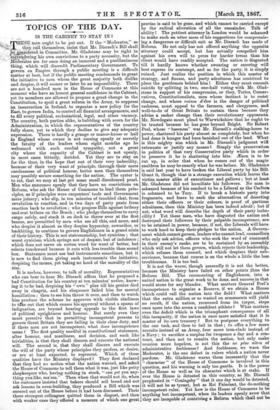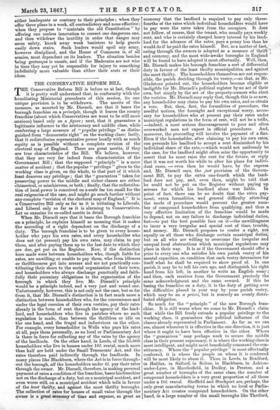TOPICS OF THE DAY.
Is THE CABINET TO STAY IN?
SE men ought to be put out. If the "Moderates," as
they- -call themselves, insist that Mr. Disraeli's Bill shall „ ppaosidered in Committee, Mr. Gladstone may be right in - surrendering his own convictions to a party necessity, but the ,Moderates are for once doing an immoral and a pusillanimous thing, which will discredit Parliamentary Government. To govern an Empire through a public meeting is a difficult matter at best, but if the public meeting condescends to grant the initiative to men whom the great majority both dislike and despise, it will sooner or later be an impossibility. There are not a hundred men in the House of Commons at this moment who have an honest general confidence in the Cabinet, yet its members are allowed to propose a great change in the Constitution, to spoil a great reform in the Army, to suppress an insurrection in Ireland, to organize a new policy for the East, to govern India, to control all financial arrangements, and to fill every political, ecclesiastical, legal, and other vacancy. The country, both parties alike, is bubbling with scorn for the Administration, in which the representatives of the country fully share, yet to which they decline to give any adequate expression. There is hardly a grange or manor-house or hall in England whose owner is not cursing openly or secretly the fatuity of the leaders whom eight months ago he welcomed with such cordial sympathy, not a great city where the capacity of the Cabinet is not openly, in most cases bitterly, derided. Yet they are to stay on for the time, in the hope that out of their very imbecility, -because of their very want of principle, through their mere carelessness of political honour, better men than themselves may possibly secure something for the nation. The oyster is to rot, that we may at last get some small discoloured pearl. Men who announce openly that they have no convictions on Reform, who ask the House of Commons to lend them prin- ciples, as if principles were carpenters' tools and Government mere joinery; who slip, in ten minutes of troubled chat, from revolution to reaction, and in two days of party panic from reaction back to revolution • who propose Bills against bribery and seat bribers on the Bench; who pledge themselves to carry cargo safely, and stack it on deck to throw over at the first breeze, are permitted by men who see all this, and more, and who despise it almost as they despise hypocrisy, cowardice, or backbiting, to continue to govern Englishmen in a grand crisis of their history. This is not statesmanship, but cynicism ; that worst cynicism which springs not of despair, but of indolence ; which does not carve on rotten wood for want of better, but selects touchwood because it cuts with less trouble than sound box. Statesmen must use bad instruments sometimes, but it is new to find them giving such instruments the initiative, despising the means, yet taking no heed of the morality of the aim.
It is useless, however, to talk of morality. Representatives who can bear to hear Mr. Disraeli affirm that he proposed a bad Constitution for his country at ten minutes' notice, know- ing it to be bad, despising his " own " plan till his genius died away in chagrin, and his eloquence failed him for mental humiliation ; then to see him throw it over, and then to watch him produce the scheme he approves with visible ieadiness to tike out that which causes his approval without a spasm of indignation, are beyond hearing appeals to the first laws of political uprightness and honour. But surely even they must perceive that in permitting incompetent persons to govern Great Britain they are failing in their clear duty, and if these men are not incompetent, what does incompetence mean ? The first quality needful in constitutional statesmen, after honour, and manliness, and decision, and such like trivialities, is that they shall discern and execute the national will. The second is, that they shall discern and execute the will of the party whose principles they profess, or desire, or are at least expected, to represent. Which of these qualities have the Ministry displayed? They first declared that they had no notion what the nation wanted, and asked the House of Commons to tell them what it was, just like petty shopkeepers who, having nothing in stock, "can get you any- thing you like, ma'am. Then when that would not do, when the customers insisted that bakers should sell bread and not ask lessons in oven-building, they produced a Bill which was sneered out of the House before it had been discussed. Their three strongest colleagues quitted them in disgust, and then with weaker ones they Offereda measure of which one great proviso is said to be gone, and which cannot be carried except by the radical alteration of all the remainder. Talk of ability! The pettiest attorney in London would be ashamed to make such an utter mess of his suggestions for compromis- ing a dangerous or difficult suit as Mr. Disraeli has made of Reform. He not only has not offered anything the opposite attorney could accept, but has actually compelled him against his own will to press for harder terms than his client would have readily accepted. The nation is disgusted till it hardly knows whether swearing or sneering will best express its contempt, and as for the party, it is simply ruined. Just realize the position in which this master of strategy, and finesse, and party adroitness has contrived to place the gentlemen behind him I Either they must commit suicide by splitting in two, one-half voting with Mr. Glad- stone in support of his compromise, or they, Tories, Conser- vatives, Constitutionalists, men whose instinct is to resist change, and whose raison d'être is the danger of political rashness, must appeal to the farmers, and clergymen, and well-to-do of Great Britain to sustain them because they advise a rasher change than their revolutionary opponents Mr. Newdegate must plead to Warwickshire that he ought to be trusted because he has gone beyond Bright. Sir Robert Peel, whose "baseness" was Mr. Disraeli's stalking-horse to power, shattered his party almost as completely, but when he' had done it hunger had been banished out of the land. What is this mighty aim which in Mr. Disraeli's judgment wilt extenuate or justify any means ? Simply the preservation in politics of that very Conservative party which in order to preserve it he is shattering into bits. 2Eison is to be cut up, in order that when he comes out of the magic cauldron he may be exactly what he was before. Mr. Gladstone is said last year to have broken the Liberal party by his Bill Grant it, though that is a strange execution which leaves the victim master alike of executioner and gallows ; but at least Mr. Gladstone did not humiliate his followers. No man in ashamed because of his conduct to be a Liberal as the Carlton is ashamed to be Tory. If to break a historic party into fragments, and leave to each the alternatives of deserting either their officers or their colours, is proof of partizan adroitness, then this Ministry has been indeed adroit ; but if not, what word will describe the depth of their party imbe- cility ? Yet these men, who have disgusted the nation and. destroyed their followers by their palpable incompetence, are to be retained in power, because, if not, the Liberals will have to work hard to keep their pledges to the nation. A Govern- ment which cannot govern, leaders who cannot lead; counsellors. who only ask advice, officers who seek the word of command in their enemy's ranks, are to be sustained by an assembly which will not let them govern, which rejects their leadership,. which refuses them counsel, and which despises their sub- servience, because that course is on the whole a little the less. troublesome. It is too bad.
It is not the worse, though assuredly it is not the better, because the Ministry have failed on other points than the Reform Bill. The recementing of Englishmen. into a united nation is the great work to be done, and success in that would atone for any blunder. What matters General Peel's incompetence to organize a Reserve, if we obtain a House which- could call the nation into the field ? What matters that the extra million or so wasted on armaments will yield no result, if the nation, recovered from its torpor, steps once more into the arena a confident athlete ? What matters even the deficit which is the triumphant consequence of all this incapacity, if the nation is once more satisfied that it is master of its own treasury But to postpone everything to.
the one task, and then to fail in that ; to offer a few more recruits instead of an Army, four more iron-clads instead* of
a Navy ; to sacrifice a surplus for twopence a day and a con- tract, and then not to reunite the nation, but only make reunion more hopeless, is not this the ne plus ultra of administrative feebleness ? And feebleness, we warn the Moderates, is the one defect in rulers which a nation never pardons. Mr. Gladstone warns them incessantly that the " character " of the House of Commons is involved in this. question, and his warning is only too,gentle. It is the power
of the House as well as its character which is at stake. If ever the House is detested in this- country, as Mr. Disraeli
prophesied in "Coningsby " that it one day would be detested, it will not be as tyrant, but as Roi Faineant, the do-nothing incompetent ruler. Yet how is the House of Commons to be
anything but incompetent, when its leaders openly avow that they are incapable of contriving a Reform which shall not be
either inadequate or contrary to their principles ; when they offer three plans in a week, all contradictory and none effective; when they propose to "maintain the old Constitution" by offering one useless innovation to correct one dangerous one, and then withdraw the inutility in order that danger may seem safety, knock away weak banisters to help guests easily down stairs. Such leaders would spoil any army, however disciplined, and the House of Commons is, of all armies, most dependent on its leaders. The situation besides being grotesque is unsafe, and if the Moderates are not wise in time they may yet be responsible for injury to something indefinitely more valuable than either their seats or their ideas.































 Previous page
Previous page